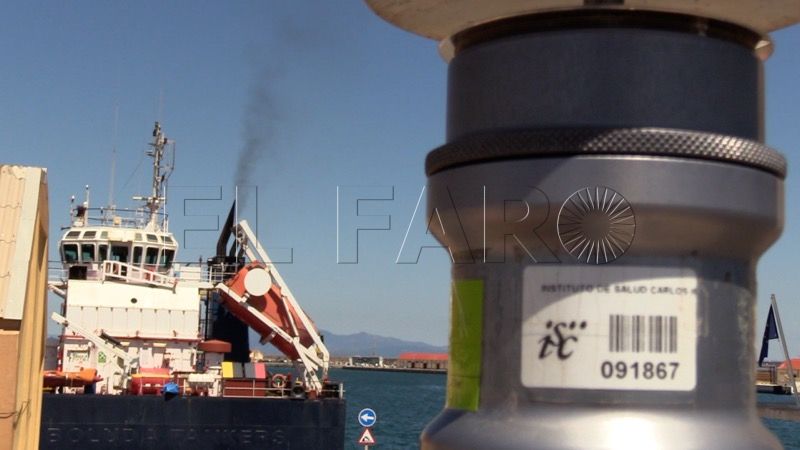Ceuta needs to improve its infrastructure to more adequately measure air pollution that is not at all healthy despite having improved as a result of the reduction in traffic and activity during the pandemic. This is one of the main conclusions of the study on ‘Air quality in the Spanish State in 2021’ recently posted by Ecologists in Action, which warns of the harmful levels of pollution for the residents of the autonomous city and the deterioration caused by the local vegetation due to these high levels of pollution. The report collects the available data from the air measuring devices that affect 47.4 million people and a territory of 504,560 square kilometers, that is, the entire country’s soil. Ceuta, despite being a city with a relatively low population compared to large cities, was in a bad spot for not being able to reduce this serious environmental problem.
The population of Ceuta is one of those that was affected by the overcoming of suspended particles, although in reality it is a problem that extends throughout all the communities, affecting 39.7 million citizens, 83.8% of the population. Spanish population. Likewise, the people of Ceuta also breathed unhealthy levels of nitrogen dioxide (NO2), exceeding the limit set by the annual guide of the World Health Organization (WHO). However, as is the case with suspended particles, it is a problem that affects a large part of the national population with 29.5 million people affected, 62.2% of Spanish citizens.
The main affected areas of the country, in addition to Ceuta, were the urban areas of A Coruña, Albacete, Alicante, Avilés, Barcelona, Bilbao, Cartagena, Córdoba, Cuenca, Elche, Gijón, Granada, Guadalajara, Huelva, Las Palmas de Gran Canaria. , León, Logroño, Madrid, Málaga, Murcia, Ourense, Oviedo, Palma, Pamplona, Pontevedra, Salamanca, Santander, Santiago, San Sebastián, Santa Cruz de Tenerife, Seville, Tarragona, Valencia, Valladolid, Vigo, Vitoria and Zaragoza, or some smaller cities of Andalusia, Castilla y León, Catalonia and the Basque Country.
Although the levels are reduced, the WHO limit for particulates and NO2 is still exceeded
The annual dossier of Ecologists in Action on air quality is not at all benign with Ceuta, where it is concluded that the Ceuta population breathed stale air in 2021, “harmful to health according to WHO recommendations”, and also the entire of the territory was exposed to levels of pollution that seriously affect the vegetation.
For the analysis of the data of the mackerel city in 2021, the association has compiled the information extracted from the only atmospheric control station that belongs to the City Government, in its third year of operation since it was launched in 2019. Ecologists in Action also emphasizes that the Ceuta Port Authority (APC) It lacks its own pollution meters.
The only air metering station is located on the Spain dock in the Port, so from the environmental entity they value that the levels of contamination can be highly influenced by maritime transport. Given this, he considers that the ideal would be to learn more about the levels in the city itself and not so much those related to the port environment.
The work also warns that the air quality website at the local level only “offers real-time data for the last hour and limits the consultation of historical data to maximum periods of 31 days, without download utility, which makes it difficult pollution monitoring.
In any case, the report says that in Ceuta, as in all of Spain, the levels have been reduced compared to 2019 when there was more mobility and economic activity before the pandemic.
They ask for more laxity with the emissions of maritime routes
The Spanish Chamber of Commerce has asked the European Union to reformulate the emission rights market directive in its application to territories with maritime transport, such as Ceuta. According to the Chamber of Spain Ports Commission, the entry into force of the new community regulations does not meet the environmental objectives it sets and will reduce the competitiveness of ports and the business fabric. In general, a more progressive transition is requested that avoids the flight of activity from European ports to third countries, as is the case of the Moroccan port of Tangier-Med in the area of the Strait. For this reason, it is requested to curb the extra cost of emission rights to avoid having “CO2 emission paradises” outside Europe.
The keys
Particle levels
In 2021, the Ceuta station recorded low levels of PM10 particles (soot, dust, ash, particles or pollen that are typical of industrial environments) without exceeding the average daily and annual values recommended by the WHO. On the other hand, PM2.5 particles (suspended particles that affect the respiratory system) did exceed the new daily and annual guidelines of the World Health Organization.
less mobility
The report also highlights that, as in the rest of the country, in the autonomous city last year the average annual concentration of nitrogen dioxide (NO2) decreased significantly, 33% compared to 2019, due to the general reduction of mobility and economic activity derived from the fight against the Covid-19 pandemic. In addition, the report emphasizes that the highest levels of pollution in the city were recorded between the months of April and September.
–


